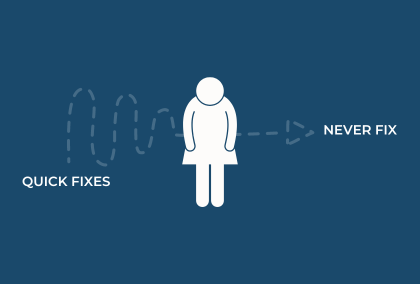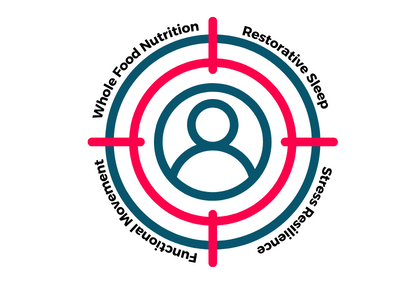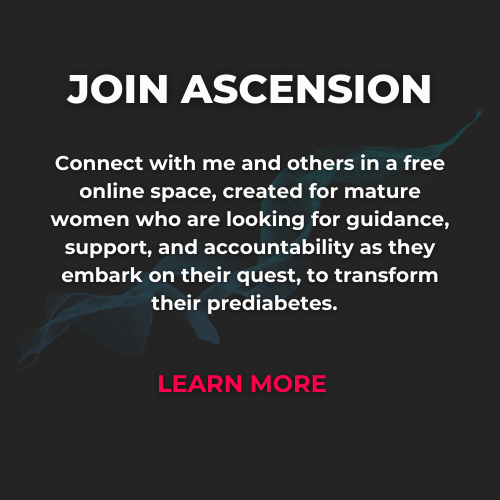Quick fix diets typically do more harm than good when it comes to achieving your health.
It’s not to say that a quick way to do something is bad.
Using different strategies and tactics can be helpful when you are further along on your journey. When you are in a place where you know exactly what’s going on for you and deeply understand the next step in your transformation.
But when you don’t know what your unique issues are and don’t fully understand your next steps, you become hyper focused on one area of your life that you believe is your problem.
And if you could solve this one thing, it would solve all of your problems. And as you search for the solutions to your problem, you become more susceptible to the intense marketing tactics used by individuals and companies who offer quick solutions that speak directly to your pain.
So if you think eating carbs is the problem, you might go for the “Ditch the Carbs and Lose Weight” plan.
Or if you think a slow metabolism is your problem, you may go for the “Boost a Slow Metabolism and Lose Weight in 30 Days” plan.
Most of these plans do work by the way…in the short term though.
I can recall this one occasion, where someone was like “OMG, you gotta try this cleanse, I lost like 10 lbs in a week.
And when I saw how good she looked and how excited she was, of course I wanted that too. And so I did it…I did the cleanse and it was treacherous. It was so restrictive but I felt it was worth it at the time, because I lost 12 pounds.
When my friends and colleagues saw my weight loss, they wanted in too. So I gave them all the details, they did the cleanse and lost weight. I can imagine they spread the word about the cleanse too.
But in the end of course, we always gain our weight back.
Why do we do this? Why do we often find ourselves in this vicious cycle?
Because we are on the lookout to find the one thing, the secret, the main ingredient that will solve all of our problems, to help us to lose weight.
We just want to jump to the tactics. We want someone to tell us what to do.
But in order to be successful with do-ing, we have to have a deeper know-ing of ourselves.
A lot of these programs are inherently flawed, because they skip this part.
They draw you in by connecting to your pain points, and offer solutions to solve them. This rarely works because these programs don’t address what’s behind the pain.
So instead of ditching the carbs, we need to look at who you are in relation to the carbs. What’s driving you to over indulge in carbs? And what do you really need to have a break-through?
It’s not the carbs. It’s about the person. Who are you!…when you are sitting behind the plate?
The Problem With The Quick Fix
When we get a quick fix plan, we expect our life to change.
But here’s the truth, when we embark upon quick fixes, it gives us an illusion that we are working towards our goals, when actually we aren’t really getting anywhere.
We get caught up in the illusion of progress and end up wasting time and energy on activities that are ultimately unhelpful and not productive.
The problem with doing a quick fix is that they tend to be superficial and don’t get to the root of the problem.
And because the root issues aren’t addressed, short-term solutions typically don’t provide lasting results, which can lead to frustration and a feeling of failure.
Quick fixes can also create a dependency on short-term solutions, keeping us out there always looking for the next best thing. This reliance on quick fixes can prevent us from learning effective problem-solving skills, which are essential for long-term success.
They really do keep us from creating meaningful changes in our lives.
Don’t Fall For The Hype
Why do we often find ourselves drawn to the allure of quick fixes despite knowing that deep down, they may not provide lasting results?
First, there is the mainstream media.
We often find ourselves lured by the enticing promises of quick fix solutions. Many companies are really good at using persuasive language to hook us in, making grand claims of guaranteed weight loss or the ability to shed pounds while indulging in our favorite foods. Some even propose that we can eat cake and lose weight too! It’s no wonder we jump all over it.
However there’s a twist—you can eat cake and maintain a healthy weight. But in order to do this, you have to develop the right mindset first. Which I will address in later parts of this article.
Second, we fall for the hype because we lack the hope that we can succeed on our own. We find ourselves trapped in a cycle of desperation, yearning for change but feeling powerless to achieve it.
This mindset blinds us to the bigger picture and leaves us vulnerable to the schemes and false promises of rapid transformations. The reality is that these quick fixes only offer temporary solutions, acting as band-aids instead of addressing the root causes of our struggles.
In the end, we aren’t really healing. Instead, we are fighting against the parts of ourselves that need to heal.
And until we can embrace those parts, we will keep setting ourselves up for failure..
Third, we fall for the hype because for many of us we just don’t want to do the work. And I’m not talking about laziness, although we believe that is the case.
In my last blog article, I addressed the importance of consistency and the tendency of many women to shy away from taking action, due to the lingering wounds inflicted by past failures.
These wounds have a detrimental effect on our self-confidence and trust in our own abilities, to the point that we are scared to do a lot of work, just to gain the weight back again. This pattern is the story of our lives.
Driven from this place of fear, we gravitate towards quick and effortless solutions that allow us to take action from within the walls of our comfort zone.
Essentially, we want to just reach over our walls of comfort and grab what we think is the next best thing. The thing that we think will solve all of our problems.
However, this approach is inherently flawed, because what we truly desire, will never be found in our comfort zone. True growth and transformation can only occur on the other side.
The other major reason I believe that we fall for the hype is because we think it’s going to take too long to reach our intended goal.
Some women are impatient and have a habitual inclination towards seeking immediate gratification. For some of us it’s almost like an addiction.
Engaging in a quick-fix diet offers a momentary surge of pleasure, particularly when it works.
When we lose weight and then slip into some skinny jeans, we can feel really good, especially when someone tells us how great we look.
This feedback provides us with a confidence boost, especially if we have low self-esteem or have been feeling depressed about our body.
A quick fix gives us this feeling of accomplishment, which is why it is often tempting to take the easy way out.

Attempting to lose weight rapidly through extreme dieting often results in nutrient deficiencies, fatigue, and other health problems.
Even worse, these solutions often lead to rebound weight gain once the diet is done.
This is how it works…
When you go on a quick weight loss plan and lose weight, you also lose your muscle mass, which is the absolute worst thing that you ever want to have happen.
Consider muscle as your ultimate life force, that maintains your physical strength and stamina as you age. If you lose it, you accelerate your risk of disability and frailty.
In terms of weight loss, your muscles are the engines that drive your metabolism.
AND THIS IS THE WORST THING…
If you lose muscle on a rapid weight loss plan and regain the weight, it predominantly comes back as fat, not the precious muscle we lost.
Which means that you are sacrificing the very thing you need to live a healthy, vital life.
To live a healthy and vibrant life, it’s essential to prioritize muscle preservation while pursuing sustainable fat loss.
Quick fixes keep us locked in a frustrating cycle of losing muscle and gaining fat, rather than achieving sustainable weight loss.
At the end of the day, our minds are designed to look for the path of least resistance, whatever is easiest to do. But that route is usually not in our best interest.
We must restrain our minds to identify anything that appears too good to be true, as it typically is.
So if you see any products or programs that promise to solve an issue and do it quickly, for example: “Quick Start To Weight Loss” or “Fix Your Metabolism Fast” or anything along the lines, you now know it’s all hype, so don’t fall for it.
Because they aren’t quick at all.
As you go from one quick solution to the next they actually cost you more time, energy, and grief in the long run, because you actually never achieved what you wanted in the first place.
At the end of the day, quick fixes–never fix.
Getting To The Roots (How To Start)
If you want to produce long lasting, sustainable weight loss and truly transform your health, you have to get to the root of the issue.
I want you to imagine a big circle with you in the middle. And way out along the edge of the circle, are all of the things that you have to work on to transform your prediabetes.
So for my clients these things would be:

We need to improve these areas to achieve optimal health.
But the issue is when you just focus along the perimeter, you focus on the what you need to do.
When you put all of your attention on “what do I need to do?”, you are disregarding the most important element, which is you in the center.
The question is not, what do I need to do?, the question should be, who is doing the what? It’s about how you relate to that thing.
I will use carbs as an example but you can substitute whatever your issue is:
Self-Reflection
Who were you before you started to over consume carbs?
- Take time for introspection and ask yourself who you were before developing a co-dependent relationship with carbs
- Reflect on what drove you to rely on carbs excessively and what needs they fulfilled for you at that time.
- Consider the emotions, situations, or individuals that influenced your overindulgence in carbs
Identify Root Causes
What did eating carbs give you? How did they help you?
- Explore the underlying factors that led to your reliance on carbs, such as seeking safety, control, or comfort during stressful times.
- Examine the different possibilities and reasons behind turning to food for emotional fulfillment. (really sit with this one)
Awareness and Consciousness
How are you unconsciously holding on to something from your past, that causes you to self sabotage now?
- Recognize that the coping mechanism of overeating or indulging in junk food is a pattern from the past that no longer serves you.
- Identify how your current eating habits are fulfilling a need.
Evaluating Current Needs
What do you want for yourself now?
- Ask yourself if you still need the same coping mechanism and if it aligns with your current situation and goals.
- Consider whether there are healthier alternatives or strategies to meet your needs, such as finding other sources of comfort or stress relief
Releasing and Letting Go
How to release those parts of yourself that are no longer serving you?
- Understand that there is always an underlying benefit or need being fulfilled by reaching for certain foods.
- Express gratitude for the role these coping mechanisms played in the past, but consciously choose to release them and find healthier alternatives.
This is the work.
There is always an underlying benefit.
It can be sugar, wine, overeating, eating in private, emotional eating, late night eating, boredom eating, they all fill a need.
Whenever one of these issues is playing out in your life, it is fulfilling an unconscious need that served you at some point in your life.
The key is becoming aware of what that is and recognizing when it shows up for you now.
And then start to release those parts that are no longer serving you. Thank them for being there in your time of need and let them go.
Build Your Foundation
Figuring out your relationship to food is a foundational practice that I invite you to embrace.
Because anything that you do, to try to change your “bad habits” with quick fix or extreme diets, may work for a little while, but unless you unravel your unique relationship with food, your efforts will be ineffective.
The more you understand who you are, you will resist the hype, no matter how good it sounds.
And then let go of the pressure to reach a certain weight, so that you use all of your energy to explore what really matters, which is you in the center and your relationship with food which is outside of you.
When you no longer have a negative relationship with food, you won’t need quick fix tactics to overcome a problem… because you won’t have that problem anymore.
When you can see that it’s not the food, it’s how a particular food has served you in the past and helped you to cope, you can release that part of yourself. And in doing so you will no longer see the need to eliminate an entire food group, because it’s not an issue for you any longer.
This is true freedom.
Want to dig deeper into this topic and start to work through your relationship with food? Schedule a complimentary coaching session HERE.




